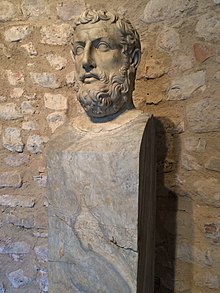
Back Parmenides Afrikaans بارمينيدس Arabic بارمنيدس ARZ Parménides d'Elea AST Parmenid Azerbaijani Парменід Byelorussian Парменид Bulgarian পার্মেনিদিস Bengali/Bangla ཕཱ་ར་མེ་ནེ་ཌི་ཟི། Tibetan Parmenid BS
Parmenides | |
|---|---|
 Bust of Parmenides discovered at Velia, thought to have been partially modeled on a Metrodorus bust. | |
| Born | c. late 6th century BC |
| Died | c. 5th century BC |
| Era | Pre-Socratic philosophy |
| Region | Western philosophy |
| School | Eleatic school |
Main interests | Ontology, poetry, cosmology |
Notable ideas | Monism, truth/opinion distinction |
Parmenides of Elea (/pɑːrˈmɛnɪdiːz ... ˈɛliə/; Greek: Παρμενίδης ὁ Ἐλεάτης; fl. late sixth or early fifth century BC) was a pre-Socratic Greek philosopher from Elea in Magna Graecia.
Parmenides was born in the Greek colony of Elea, from a wealthy and illustrious family.[a] His dates are uncertain; according to doxographer Diogenes Laërtius, he flourished just before 500 BC,[b] which would put his year of birth near 540 BC, but in the dialogue Parmenides Plato has him visiting Athens at the age of 65, when Socrates was a young man, c. 450 BC,[c] which, if true, suggests a year of birth of c. 515 BC.[1] He is thought to have been in his prime (or "floruit") around 475 BC.[2]
The single known work by Parmenides is a poem whose original title is unknown but which is often referred to as On Nature. Only fragments of it survive. In his poem, Parmenides prescribes two views of reality. The first, the Way of "Aletheia" or truth, describes how all reality is one, change is impossible, and existence is timeless and uniform. The second view, the way of "Doxa", or opinion, describes the world of appearances, in which one's sensory faculties lead to conceptions which are false and deceitful.
Parmenides has been considered the founder of ontology and has, through his influence on Plato, influenced the whole history of Western philosophy.[3] He is also considered to be the founder of the Eleatic school of philosophy, which also included Zeno of Elea and Melissus of Samos. Zeno's paradoxes of motion were developed to defend Parmenides' views. In contemporary philosophy, Parmenides' work has remained relevant in debates about the philosophy of time.
Cite error: There are <ref group=lower-alpha> tags or {{efn}} templates on this page, but the references will not show without a {{reflist|group=lower-alpha}} template or {{notelist}} template (see the help page).
- ^ Curd 2004, pp. 3–8.
- ^ Freeman 1946, p. 140.
- ^ Palmer 2020.
© MMXXIII Rich X Search. We shall prevail. All rights reserved. Rich X Search